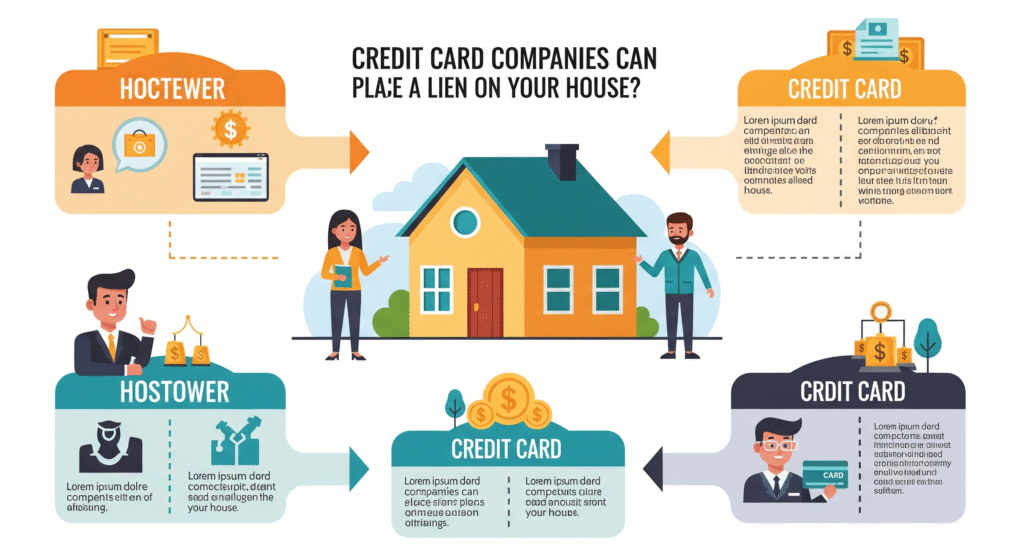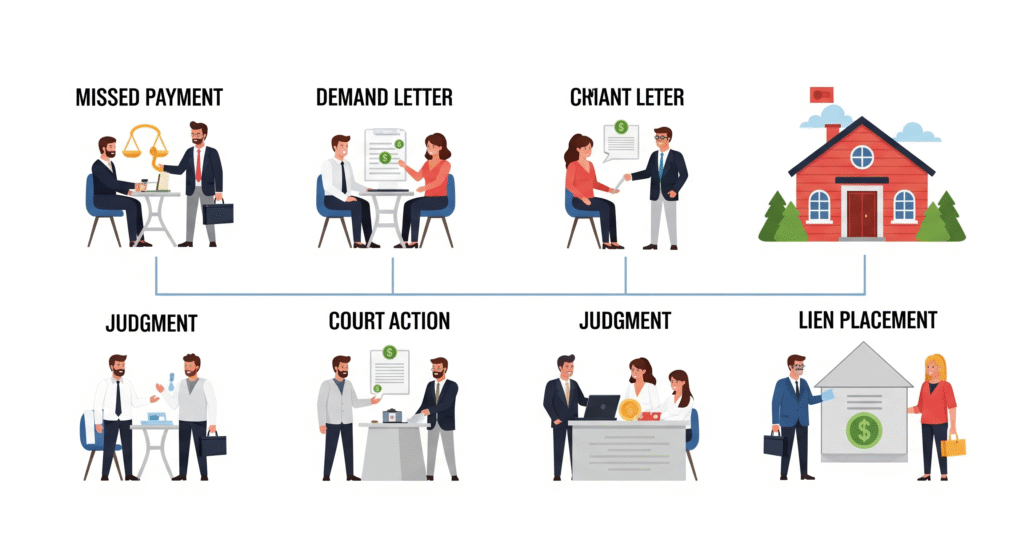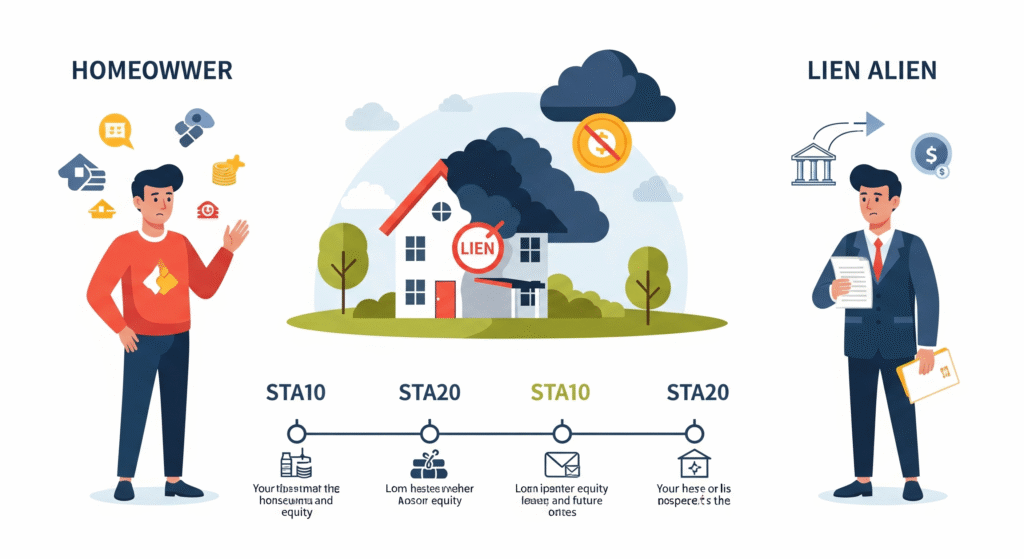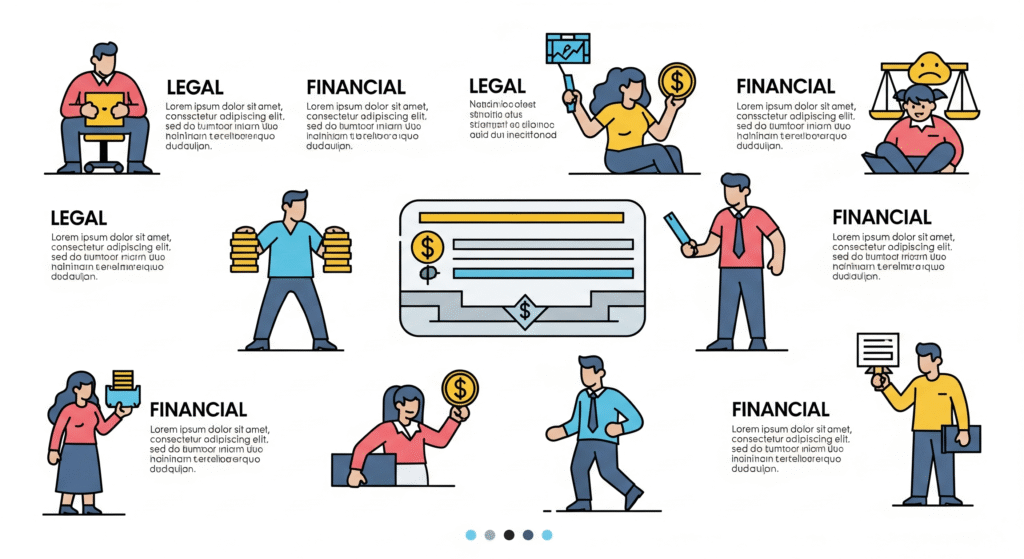
Can Credit Card Companies Put a Lien on Your House? Here’s What You Need to Know
Credit Card Companies Put a Lien on Your House Many people worry that unpaid credit card debt could lead to losing their home. While credit card companies cannot immediately place a lien on a house, if they obtain a court judgment against a debtor, they can legally put a lien on the property. This means the lien may affect the sale of the home, as the debt would need to be settled first.
However, liens from credit card debt are not as automatic or common as those from mortgages or tax authorities. A creditor must go through the court process before making a claim on the home, and some types of liens simply do not attach to residential property under certain state laws. Understanding the legal steps and protections involved is essential for homeowners facing credit card debt issues.
Understanding Credit Card Debt and Liens
Credit card debt is typically unsecured, meaning it is not tied directly to any property. However, unpaid balances can lead to legal actions where creditors seek to recover funds through courts. This process often involves judgments and liens, which impact a debtor’s financial options and property rights.
Definition of Credit Card Debt
Credit card debt arises when a person uses a credit line to make purchases or withdraw cash without paying the full balance by the due date. This debt is unsecured, meaning no physical asset secures the loan.
The unpaid balance accrues interest and fees, increasing the amount owed. Legal consequences appear if the borrower consistently defaults, including collection calls, lawsuits, or judgments.
Certain offenses, such as felony credit card abuse or credit card fraud, involve criminal charges distinct from regular credit card debt. These charges can result in convictions separate from civil debt proceedings.
What Is a Lien?
A lien is a legal claim against a property that secures a creditor’s interest in the debtor’s asset until the debt is paid. It does not transfer ownership but gives the lienholder a right to payment from the property’s sale.
Liens usually arise from secured debts like mortgages or tax bills but can be placed on property following a court judgment related to unsecured debts, including credit card debts.
In many states, homestead exemptions protect a primary residence from liens for unsecured debts. For example, Florida’s constitution prevents credit card liens on the homestead.
How Liens Work With Unsecured Debt
Credit card debt is unsecured but creditors can still get a lien through legal steps. First, the creditor must sue the debtor and obtain a court judgment confirming the debt.
With the judgment, the creditor may file a lien against real property records. This lien can hinder selling or refinancing the property but usually does not allow immediate seizure or forced sale.
Statutes of limitations, such as Georgia’s period for credit card debt, limit when creditors can legally pursue judgments. Liens may not attach to homes protected by state-specific exemptions, limiting the creditor’s reach.
Legal Pathways Credit Card Companies Use to Place a Lien on a House

Credit card companies must follow specific legal steps before placing a lien on a homeowner’s property. These steps involve filing lawsuits, obtaining court judgments, and then using those judgments to encumber the property. Each step requires adherence to legal procedures and varies by state.
Debt Collection Lawsuits
Credit card creditors begin by filing a debt collection lawsuit when payments have not been made for an extended period. The lawsuit is necessary because credit card debt is unsecured—it has no collateral backing it. In Georgia, the statute of limitations for credit card debt is typically six years, meaning companies must file within this timeframe.
If the creditor sues, the case can be taken to small claims court for debts under a certain amount. For example, they might use this for amounts less than $15,000. The lawsuit process gives the debtor an opportunity to contest the debt or negotiate repayment.
Obtaining a Judgment
To move forward with placing a lien, the creditor must first obtain a court judgment. This judgment legally confirms that the debtor owes the money claimed. It often involves the court reviewing evidence and deciding in favor of the credit card company.
Once a judgment is granted, it becomes a legal tool that allows further actions against the debtor’s assets. However, this does not immediately give the creditor rights to a lien on the debtor’s house. Additional steps must be taken to enforce the judgment.
Enforcing a Judgment Through Property Liens
After securing a judgment, the creditor may file the judgment with the county recorder’s office to place a lien on real property owned by the debtor. This lien acts as a claim against the home but does not mean the creditor can force a sale immediately.
States like Georgia provide homestead exemptions that protect some or all of a home’s equity from liens by unsecured creditors. This limits what the credit card company can collect by placing a lien. The lien stays on the property title and can impact refinancing or sale until the debt is cleared.
Properties held in trusts or those with specific ownership structures, such as irrevocable trusts, typically complicate enforcement. Credit card companies cannot usually place a lien on these without further legal action.
State Laws and Variations in Lien Procedures
Lien procedures and the ability for credit card companies to place liens on a house vary significantly depending on state laws. These differences impact how judgments are enforced, which properties can be affected, and the protections available to homeowners.
Role of State-Specific Statutes
Each state has statutes governing creditor actions after a judgment is obtained. Generally, a credit card company must first sue and win a judgment before placing a lien on real property. The timing and process for filing liens, as well as creditor rights, are dictated by state law.
For example, the statute of limitations for credit card debt varies by state. In Georgia, it is typically six years, which affects how long a creditor has to file a lawsuit. The lien must be properly recorded with the county recorder where the property is located, following precise procedural rules to be valid.
Examples of State Differences
States differ on how liens affect home equity and priority among creditors. In Daly City, California, a home equity loan lender might hold a second position lien behind the primary mortgage, limiting other creditors’ claims. Virginia’s home equity loan rates and lien structures also reflect state-specific creditor protections and borrower rights.
Additionally, some states allow judgment liens to attach only to certain types of properties or restrict the amount of equity that can be reached. These variations affect whether and how credit card companies can enforce liens.
Homestead Exemptions
Many states provide homestead exemptions that protect a portion of home equity from creditor liens. These exemptions serve as a barrier to prevent a creditor from seizing an entire property for unpaid credit card debt.
The size and rules of these exemptions differ widely. For instance, some states may exempt up to $50,000 in equity, while others offer more extensive protections. Homeowners should review their state’s exemption limits carefully, as these can be critical in defending against liens resulting from credit card debt.
The Impact of a Lien on Your House

A lien on a house directly affects the homeowner’s ability to manage the property’s financial and legal aspects. It can create obstacles when selling or refinancing and influence credit evaluations. Homeowners should understand these consequences clearly to avoid unexpected complications.
Effect on Home Sales and Refinances
When a lien is placed on a house, it must be resolved before the property can be sold or refinanced. Buyers and lenders require a clear title, so liens act as legal claims that must be paid off first.
This can delay or halt home sales, forcing the homeowner to settle debts or negotiate lien releases. Refinancing options, including real estate lines of credit or home equity loans, may become restricted when liens exist. Lenders providing home equity line of credit (HELOC) rates—whether in locations like Wichita, KS, or Connecticut—usually demand no outstanding liens on the property to minimize risk.
In cases of closed-end home equity loans, a lien can complicate loan approval since the house serves as collateral. Clearing the lien is essential for smooth real estate or financial transactions involving the property.
Credit Score Consequences
While a lien itself is a legal claim on property, it often indicates underlying unpaid debt, which can harm a homeowner’s credit profile. Credit card companies obtaining court judgments and then placing liens signal serious delinquency.
This negative mark may not appear directly on credit reports but related delinquent accounts, judgments, or collections likely will. Lower credit scores can lead to higher interest rates on loans, including those for mortgages or HELOCs, increasing the homeowner’s financial burden.
Moreover, poor credit can reduce eligibility for competitive home equity line of credit rates in Connecticut or other areas. Maintaining timely payments and preventing liens helps protect credit standing and borrowing power.
Potential for Foreclosure
A lien from a credit card company is not common without a court judgment, and even then, it does not automatically lead to foreclosure. However, some liens, particularly mortgages or closed-end home equity loans, can result in foreclosure if unpaid.
Foreclosure occurs when secured debts backed by the house are not addressed. Unlike credit card liens, these creditors have stronger legal claims on the property itself. A judgment lien from unsecured debt, such as credit cards, generally does not grant foreclosure rights.
Still, unresolved liens reduce homeowner control and can lead to forced sales if other secured debts are unpaid. Keeping liens from accumulating and addressing debts promptly is vital to prevent foreclosure risks.
Protecting Your Home From Credit Card Debt Liens
Homeowners facing credit card debt should understand how to prevent liens from affecting their property. Taking proactive steps such as negotiating with creditors, exploring repayment options, and obtaining legal guidance helps safeguard the home from potential claims.
Negotiating With Creditors
Creditors usually must obtain a court judgment before placing a lien on a property. Negotiating with them directly can prevent escalation. Borrowers can request reduced payment plans or settlements, especially through programs like guidance line of credit services offered by some financial institutions.
Effective negotiation often involves clear communication and a realistic repayment proposal. Credit unions that offer business credit cards may provide more flexible terms or hardship assistance. Timely communication can delay legal action, reducing the risk of liens attaching to the home.
Debt Management and Repayment Options
Managing credit card debt strategically reduces the threat of liens. Debt consolidation or balance transfers can simplify payments. Programs like Supernova Payment solutions may offer structured repayment plans to avoid defaults.
A formal debt management plan, often arranged through credit counseling agencies, can help prioritize debt repayment without risking property liens. These plans work best when creditors agree to modified terms, allowing the homeowner to avoid court judgments that lead to liens.
Seeking Legal Advice
Legal counsel is crucial when credit card payments become unmanageable. An attorney can clarify state-specific protections, such as homestead exemptions in Florida, which prevent liens on primary residences.
Legal experts can also assist in disputing wrongful judgments or negotiating lien removals. They help ensure that the homeowner’s rights are protected and can guide through bankruptcy options if needed, aiming to shield the home from unsecured debt claims.
Judgment Liens Compared to Other Types of Property Liens
Liens on property vary by type, purpose, and priority. Some liens arise from unpaid debts confirmed by courts, while others secure loans or taxes. Understanding the differences helps clarify rights and risks related to a home’s title or refinancing.
Judgment Lien vs. Mortgage Lien
A judgment lien results from a court ruling after a creditor sues for unpaid debts, such as credit card balances. The lien attaches to the property only after the judgment is recorded, potentially leading to forced sale if debts remain unpaid.
In contrast, a mortgage lien is consensual and tied directly to a loan used to purchase or refinance a home. It holds primary priority over most other liens, including judgment liens. This means mortgage lenders are paid first if the property sells.
For example, a home equity loan in Daly City could create a second-position lien behind the primary mortgage. Mortgage liens typically affect interest rates and refinancing options significantly more than judgment liens.
Tax Liens and Credit Card Liens
Tax liens arise from unpaid federal, state, or local taxes. These liens have high priority, often superseding mortgages and judgment liens. Tax authorities can enforce collection by seizing property if the tax debt remains unresolved.
Meanwhile, credit card liens originate from court judgments, making them unsecured debt turns secured. They only apply once a creditor sues and records the judgment. Credit card liens rank lower in priority than tax liens and mortgages.
In Virginia, for instance, tax lien laws are strict, affecting home equity loan rates. Homeowners facing tax liens can see significant challenges refinancing or accessing construction lines of credit due to lien priority.
Home Equity Loans and Lines of Credit
Home equity loans and lines of credit (HELOCs) are forms of secured debt backed by the home’s equity. These liens usually come in second position after the primary mortgage, which affects borrowing costs and loan terms.
A cash value line of credit is similar but often tied to life insurance policies rather than real estate. Construction lines of credit provide funds for building projects and usually secure their lien on the home or land under development.
The second-position lien status of home equity loans impacts financing availability in places like Daly City and Virginia. Lenders evaluate existing liens to determine approval and interest rates. Judgment liens from credit card debts can complicate these arrangements by adding claims on the property title.
Financial Planning and Prevention Strategies
Managing credit card debt effectively can reduce the risk of financial strain and protect personal assets. Strategic practices in spending, borrowing, and payment methods help maintain control over finances and avoid legal complications.
Maintaining Healthy Credit Card Habits
Consistent, on-time payments are essential to avoid debt accumulation and potential legal judgments. Setting up automatic payment plans can help ensure payments are made promptly, preventing late fees and interest rate increases.
It is wise to keep credit utilization below 30% of your available credit to maintain a strong credit score. Regularly reviewing statements to detect errors or fraudulent activity also supports financial health.
Avoid using credit cards for elective medical procedures without a clear repayment plan. For example, when considering orthodontist payment plans, patients should compare options carefully to avoid unexpected debt. Paying off balances each month limits interest charges.
Alternatives to Credit Card Use
Using alternatives can reduce reliance on credit cards and lower debt risk. Personal loans with fixed rates often offer lower interest compared to credit cards.
For medical expenses like LASIK, carefully evaluating if one should pay with a credit card is vital. Considering specialized healthcare financing or negotiating directly with providers for payment terms may be safer.
Cash or debit payments for everyday purchases can help control spending and prevent carrying a balance. Budgeting with realistic limits and tracking expenses regularly improves financial discipline.
Using Home Equity Responsibly
Home equity can be a resource but must be used cautiously. Drawing on a home equity loan or line of credit for debt consolidation may reduce interest costs but increases risk if payments are missed.
Credit card debts are generally unsecured, but failing to manage them could lead to judgments against other assets. Responsible use of home equity involves understanding terms, fees, and the potential impact on property.
Before borrowing against a home, consulting a financial advisor and weighing other options can protect ownership and maintain financial stability.
When to Seek Professional Help
If credit card debt threatens property or legal actions escalate, knowing when to get expert support is crucial. Professional help can guide resolution strategies, protect assets, and clarify rights.
Working With Credit Counselors
Credit counselors specialize in managing debt and negotiating with creditors. They can help create a realistic repayment plan tailored to the individual’s financial situation. Counselors often assist with budgeting and may arrange debt management programs that reduce interest or monthly payments.
They do not charge for initial consultations, but ongoing services might incur fees. One key advantage is avoiding lawsuits or liens by proactively addressing creditor concerns. However, credit counselors cannot remove liens or legal judgments imposed by courts. Their role is preventive and supportive rather than legal representation.
Hiring an Attorney
An attorney provides legal advice and representation when lawsuits or liens become likely. They review court documents, help challenge unfair claims, and negotiate settlements. Attorneys understand specific state laws that affect liens, including homestead exemptions protecting certain home equity values.
Legal fees vary and may include hourly rates or flat fees. An attorney will clarify if additional charges apply, such as court or transaction fees. Hiring an attorney is essential when facing judgments, as they can advise if liens on a house are legally permissible in that state and how to contest them.
Bankruptcy Considerations
Filing for bankruptcy may protect a home from liens or foreclosure due to credit card debt. Bankruptcy types like Chapter 7 or Chapter 13 offer different debt relief options. A bankruptcy attorney evaluates eligibility, explains risks, and handles paperwork.
This process can pause collection efforts and stop liens from attaching to property. However, bankruptcy has long-term credit implications and may come with costs related to filing fees and legal representation. Consulting a specialist early ensures the best approach to safeguarding assets and managing unsecured debt effectively.
Related Legal and Financial Considerations

Credit card debt carries specific risks and consequences related to collection efforts, business credit responsibilities, and dispute resolution. Navigating these issues requires understanding the limits creditors face, especially when it comes to securing debts with property or handling contested charges.
Debt Collection Practices
Credit card companies cannot directly place a lien on a debtor’s home without first obtaining a court judgment. Once a judgment is secured, they may file it publicly, creating what is known as a judgment lien. However, many states have homestead exemptions protecting homes from liens on unsecured debts like credit cards.
Debt collectors must adhere to federal laws such as the Fair Debt Collection Practices Act (FDCPA), which limits harassment and unfair tactics. For example, wage garnishment or bank levies may occur only after court approval. Consumers dealing with collection accounts should keep accurate records, including using credit card reconciliation software, to track payments and disputes efficiently.
Business Credit Liability
When a business uses a credit line, such as a TN bank business line of credit, the owner or authorized person may bear personal liability depending on the loan terms. Unlike personal credit cards, these lines of credit often involve secured collateral or personal guarantees, increasing the risk of liens on business or personal assets if debts go unpaid.
Understanding the distinction between personal and business credit liabilities is critical. Using a credit card for business expenses like buying a proxy service may blur these lines if not managed with clear bookkeeping. Businesses must separate these finances and reconcile expenditures properly to avoid unexpected legal issues related to credit defaults.
Common Credit Card Disputes
Disputes typically arise over unauthorized charges, billing errors, or failure to deliver goods and services. The Fair Credit Billing Act (FCBA) provides protections, allowing consumers to withhold payment on disputed amounts while investigations occur.
Timely reporting is crucial. Consumers should keep documentation and use tools like credit card reconciliation software to monitor accounts precisely. Disputes involving business purchases, such as software or proxy services bought with a credit card, may require additional communication with vendors and credit issuers to resolve conflicts swiftly and maintain credit standing.




